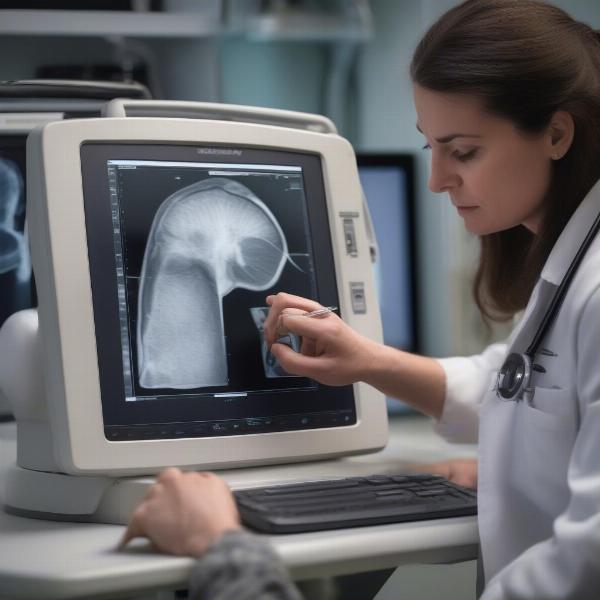Ultrasound machines for dogs have become increasingly important tools in veterinary diagnostics, offering a non-invasive way to examine internal organs and assess various health conditions. This guide will delve into the uses, benefits, and considerations for using ultrasound technology in canine care, offering valuable insights for both pet owners and veterinary professionals.
Understanding the Applications of Dog Ultrasound Machines
Ultrasound technology uses high-frequency sound waves to create images of internal organs, tissues, and blood flow. In veterinary medicine, it’s a versatile tool used for a variety of purposes, including:
- Diagnosis of internal diseases: Ultrasound can help identify tumors, cysts, infections, and other abnormalities in organs like the liver, kidneys, spleen, and bladder.
- Pregnancy diagnosis and monitoring: Veterinarians use ultrasound to confirm pregnancy, estimate litter size, and monitor fetal development.
- Guiding biopsies and other procedures: Ultrasound can be used to precisely guide needles during biopsies, aspirates, and other minimally invasive procedures.
- Cardiac evaluations: Echocardiography, a specialized form of ultrasound, allows veterinarians to assess heart function and identify heart diseases.
- Emergency assessments: Ultrasound can be rapidly deployed in emergency situations to assess for internal bleeding, fluid accumulation, and other life-threatening conditions.
Benefits of Using Ultrasound in Canine Care
Ultrasound offers numerous advantages over other diagnostic imaging techniques:
- Non-invasive and painless: The procedure is generally comfortable for dogs and doesn’t require sedation in most cases.
- Real-time imaging: Ultrasound provides real-time images, allowing veterinarians to observe organ movement and function dynamically.
- Safe and radiation-free: Unlike X-rays, ultrasound doesn’t use ionizing radiation, making it a safe option for pregnant dogs and repeated examinations.
- Cost-effective: While the initial investment in an ultrasound machine can be significant, the cost per examination is relatively low compared to other imaging modalities.
- Portable and versatile: Portable ultrasound machines allow for point-of-care diagnostics, especially beneficial in remote areas or emergency situations.
Choosing the Right Ultrasound Machine for Dogs
 Veterinarian Analyzing Dog Ultrasound
Veterinarian Analyzing Dog Ultrasound
Selecting an appropriate ultrasound machine depends on several factors, including the intended use, budget, and technical expertise of the operator. Factors to consider include:
- Image quality: Higher frequency transducers generally provide better resolution, which is crucial for detailed imaging.
- Portability: Portable units are convenient for mobile clinics and house calls.
- Features and software: Advanced features like Doppler imaging and 3D/4D capabilities can enhance diagnostic capabilities.
- Ease of use: User-friendly software and intuitive controls are essential for efficient operation.
- Cost and maintenance: Consider the initial purchase price, ongoing maintenance costs, and availability of technical support.
“Choosing the right ultrasound machine is an investment in better patient care,” says Dr. Emily Carter, DVM, a leading veterinary radiologist. “The ability to quickly and accurately diagnose internal conditions is invaluable in providing timely and effective treatment.”
Conclusion
Ultrasound machines for dogs are an invaluable asset in modern veterinary practice. They provide a safe, non-invasive, and effective way to diagnose a wide range of conditions, improving the quality of care for our canine companions. Investing in the right ultrasound machine can significantly enhance a veterinary clinic’s diagnostic capabilities and improve patient outcomes.
FAQ
- Is ultrasound safe for pregnant dogs? Yes, ultrasound is considered safe for pregnant dogs and their developing puppies as it doesn’t use ionizing radiation.
- Does my dog need to be sedated for an ultrasound? In most cases, sedation isn’t necessary. However, some dogs may require mild sedation if they are anxious or unable to remain still during the procedure.
- How much does a dog ultrasound cost? The cost of an ultrasound can vary depending on the complexity of the examination and the geographic location.
- What can an ultrasound detect in dogs? Ultrasound can detect a variety of conditions, including tumors, cysts, infections, fluid accumulation, and pregnancy.
- How long does a dog ultrasound take? The duration of an ultrasound examination typically ranges from 15 to 60 minutes, depending on the area being examined.
- Can ultrasound be used to diagnose heart problems in dogs? Yes, echocardiography, a specialized form of ultrasound, is used to assess heart function and identify heart diseases in dogs.
- Are portable ultrasound machines as effective as larger units? While larger units may offer more advanced features, portable ultrasound machines can be just as effective for many diagnostic purposes, particularly in point-of-care settings.
Related Articles:
dog blood pressure machine
dog abdomen x ray
dog blood pressure monitor
dog ecg
About ILM Dog
ILM Dog is your trusted resource for all things canine. We offer expert advice on dog breeds, health, training, nutrition, grooming, and much more. From puppy care to senior dog support, we cover every aspect of dog ownership. Whether you’re a seasoned dog owner or just starting your journey, ILM Dog is here to help you provide the best possible care for your furry friend. Contact us at [email protected] or +44 20-3965-8624 for personalized support and guidance.